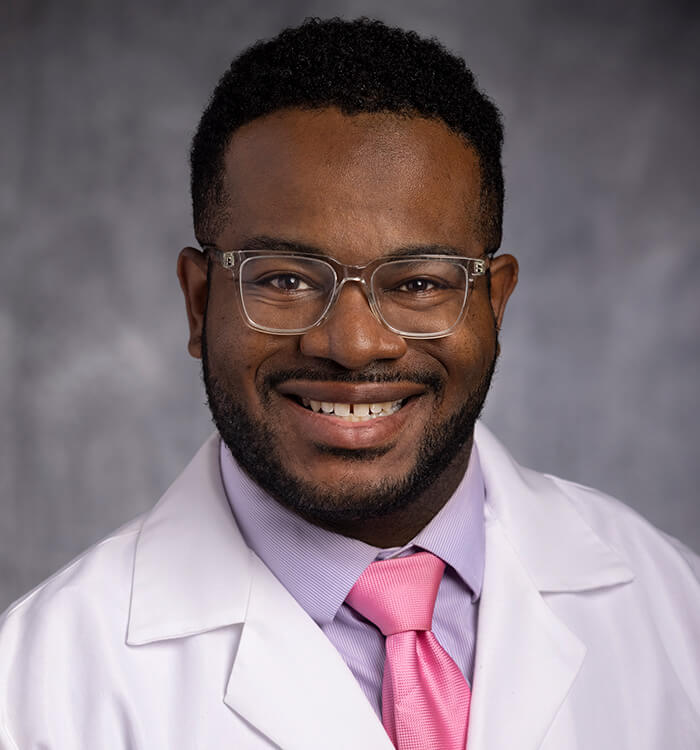Spotlight on Cerebrovascular and Skull Base Fellow Marcus Stephens MD
February 15, 2023
Innovations in Neurology & Neurosurgery | Winter 2023
Growing up, Marcus Stephens, MD, dreamed of becoming a professional musician. An accomplished jazz guitarist, Dr. Stephens did not decide he wanted to become a doctor until he was halfway through college. Now, he is the Cerebrovascular and Skull Base Fellow at the University Hospitals Neurological Institute.
 Marcus Stephens, MD
Marcus Stephens, MDA graduate of Hampton University in Hampton, Virginia, Dr. Stephens’ interest in neuroscience began during his time at Meharry Medical College in Nashville, Tennessee. He went on to complete residency training at the University of Arkansas for Medical Sciences (UAMS) College of Medicine. As chief resident, Dr. Stephens studied under J.D. Day, MD, an internationally known leader in skull base surgery and a specialist in Gamma Knife procedures and vascular disorders of the brain and skull base. “With Dr. Day as my mentor at UAMS, I did quite a bit of skull base and cerebrovascular neurosurgery,” he says. “I have always enjoyed working with my hands and developed a strong interest in that subspecialty.”
A few years ago, Dr. Stephens met Nicholas C. Bambakidis, MD, Chair of the Department of Neurological Surgery, Director and Vice President of the UH Neurological Institute and Harvey Huntington Brown Jr. Chair in Neurosurgery at Case Western Reserve University School of Medicine.
“I knew I wanted to complete an extra year of specialized training in skull base and cerebrovascular neurosurgery, and the opportunity to work as his fellow brought me to University Hospitals,” he says. “Dr. Bambakidis has been an excellent mentor, and we have developed a friendship. He has pushed my neurosurgical skillset to the next level, and I feel confident to go into practice later this year and take care of my patients.”
The one-year clinical fellowship offered by the Department of Neurological Surgery at UH Cleveland Medical Center trains physicians in the surgical management of neurovascular disorders and complex skull base tumors. It provides a comprehensive educational experience in cerebrovascular and skull base neurosurgery. Fellows like Dr. Stephens become an integral part of the department and actively participate in the training and education of residents and medical students.
“We recruited Dr. Stephens from a highly competitive pool of applicants who were completing top residency programs and were interested in UH because of our high volume of complex open cerebrovascular and skull base cases,” says Dr. Bambakidis. “He is a terrific neurosurgeon and has obviously become a valued team member in the operating room. He has also proven to be a very impactful teacher for our residents and medical students, which contributes to the culture of our program. I am confident he is going to go on to accomplish great things.” After completing his fellowship this summer, Dr. Stephens will join a medical practice in Atlanta as its skull base partner.
Technical Mastery
Dr. Stephens is driven to maintain the highest technical standards that neurosurgery demands. “I still go to the skull base lab and work on dissections just like a professional basketball player would shoot free throws,” he says. “One constant that my mentors drilled into me is continuing to strive for technical excellence as a surgeon. I think it is important to push ourselves because it directly correlates with better patient outcomes.”
Academic Medicine
One of Dr. Stephens’ research interests in skull base neurosurgery involves vestibular schwannoma, benign tumors that can develop on vestibular or cochlear nerve endings. “I am interested in exploiting anatomical relationships to make surgery more efficient and less taxing and traumatic for the patient,” he says. “Right now, I am looking at outcomes comparing different methods of resecting vestibular schwannomas and how they relate to hospital length-of-stay and the overall postoperative course of a patient.”
UH Department of Neurological Surgery
In addition to the Cerebrovascular and Skull Base Fellowship, the UH Department of Neurological Surgery offers fellowships in:
- Endovascular neurosurgery
- Neurocritical care
- Stereotactic and functional neurosurgery
For more information on Department of Neurological Surgery fellowships at University Hospitals, contact Dr. Bambakidis at Nicholas.Bambakidis2@UHhospitals.org.
Contributing Experts:
Marcus Stephens, MD
Cerebrovascular and Skull Base Fellow
University Hospitals Neurological Institute
Nicholas C. Bambakidis, MD
Vice President and Director
University Hospitals Neurological Institute
Harvey Huntington Brown, Jr. Chair in Neurosurgery
University Hospitals Cleveland Medical Center
Professor ,Case Western Reserve University School of Medicine


